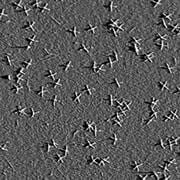
The Max Planck Institute for Polymer Research (German: Max-Planck-Institut für Polymerforschung) is a scientific center in the field of polymer science located in Mainz, Germany
The Latest Bing News on:
Max Planck Institute for Polymer Research (MPI-P) Research
- Study unveils 3D printing PQD-polymer architectures at room temperature
A technology enabling the fabrication of intricate three-dimensional (3D) quantum dot (QD)-based structures at room temperature has been developed.
- Max Planck develops method to speed up spectroscopic analysis
Researchers have developed a technique to speed up spectroscopic analysis. The results of the project led by Hanieh Fattahi, Research group leader at the Max Planck Institute of the Science of Light, ...
- Peptides on interstellar ice: Study finds presence of water molecules not a major obstacle for formation
A research team led by Dr. Serge Krasnokutski from the Astrophysics Laboratory at the Max Planck Institute for Astronomy at the University of Jena had already demonstrated that simple peptides can ...
The Latest Bing News on:
Max Planck Institute for Polymer Research (MPI-P) Discovery
- Max Planck develops method to speed up spectroscopic analysis
Researchers have developed a technique to speed up spectroscopic analysis. The results of the project led by Hanieh Fattahi, Research group leader at the Max Planck Institute of the Science of Light, ...
- Max Planck Society
A new model developed by scientists from the Max Planck Institute for Dynamics and Self-Organization (MPI-DS) extends the ... A multidisciplinary research team led by scientists at the Max Planck ...
- Discovery of the first fractal molecule in nature
An international team of researchers led by groups from the Max Planck Institute in Marburg and the Philipps University in Marburg has stumbled upon the first regular molecular fractal in nature.
- Director at the Max Planck Institute for Human Cognitive and Brain Sciences
Germany The Max Planck Institute for Human Cognitive and Brain Sciences (MPI CBS) in Leipzig, Germany, invites nominations, including self-nominations, for a Director who is expected to lead a ...
- The Max Planck Society must end its unconditional support for Israel
We, a diverse group of employees at the Max Planck Society (MPS), Germany’s top research institution ... on a visit to Israel and the Weizmann Institute of Science and expressed his support ...









